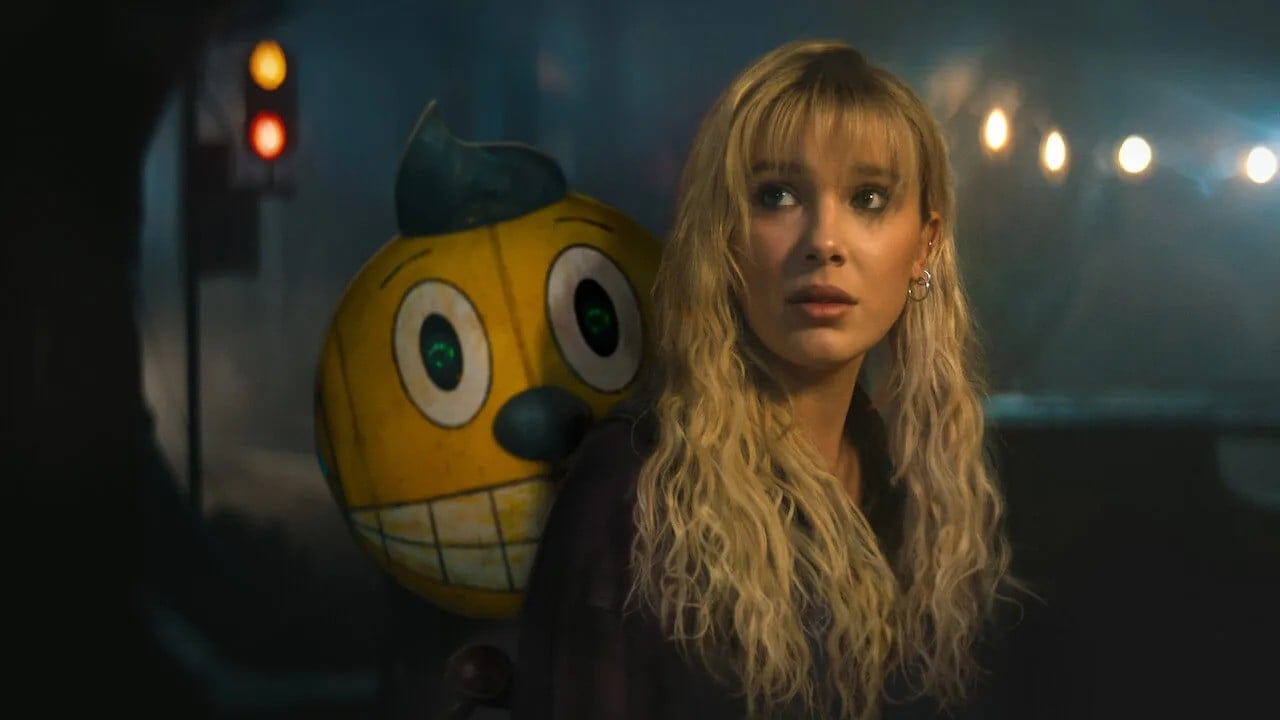The 2018 illustrated novel that Anthony and Joe Russo’s The Electric State is based on is an elegiac tone poem about an America left derelict by its stewards. The nation that Simon Stålenhag envisioned is a 3,500-mile drug den, where people are in nonstop, VR-mainlined communion with the enormous, happy corporate mascots that humanity created. Constant stimulation and flashing lights in your VR helmet is what amounts to self-care here.
To the extent that the Russos’ mega-budget Netflix adaptation plays out like it wants its audience to feel as if they’re at the mercy of capitalism, The Electric State could be read as a subversive, metatextual success. But it’s obvious that the film is meant to be taken at face value. There’s nothing behind its contemptible eyes, no spine to house the fading diode that once contained a soul. This is “content” at its most nakedly bankrupt.
The film’s opening pays lip service to the technological singularity of corporate-made drones becoming sentient enough to argue to be seen as living, thinking beings. But once we settle into The Electric State’s alternate 1994, where robots are illegal, the gears shift. From there, and in place of a thoughtful musing on America’s humanity dissolving in a pool of content sludge pumped directly to the cerebellum, the film scans as a facsimile of a late-’80s Amblin joint.
An orphaned teen named Michelle (Millie Bobby Brown) gets on the road toward the robot exclusion zone with a happy-faced drone that appears to be remotely controlled by her supposedly dead brother, in search of his flesh-and-blood body, which is being held inside the HQ of an Amazon-ian server farm. She’s eventually joined by Keats (Chris Pratt), a dorky veteran of the robot uprising, and his hip, Black-coded robot sidekick, Herman (voiced by Anthony Mackie). (For those wondering, that subplot is exactly as cringe-inducing as it sounds.)
It’s hard to imagine an ’80s road-trip movie about robots written by ChatGPT turning out much different, if ever so slightly less cohesive. Every cheap quip, action beat, and moment of physical comedy plays out like the slurry of every kids’ film from the last 40 years. This is a banal scrapple of supposed four-quadrant appeal double fried and presented up without any sense of spice or personality. And just when you thought things couldn’t get any worse, a pervasive ickiness starts to overpower the boredom of it once a ragtag band of bots serving as comic relief and led by the disquieting cybernetic visage of a robotic Mr. Peanut—who, as voiced by Woody Harrelson, is played as serious as a heart attack—decide to help our heroes in their quest.
The closest thing that The Electric State gets to a bright spot is Stanley Tucci as the narrative’s icy, legally distinct Jeff Bezos figure, who’s in charge of America’s dependence on VR and is laser-focused on his achievement regardless of the consequences to humanity. Tucci’s scenes with Giancarlo Esposito’s vicious robot bounty hunter represent the brief flicker of a better film, fading out before the plot can head too far toward its direction.
One could also praise the robot effects, but a film touting a preposterous $350 million budget should have so much more to show for the effort, especially at a time when so many recent films have done so much more, visually and thematically, with exponentially less (Gareth Edwards’s The Creator immediately comes to mind). The effects may look good on the surface, but considering everything that the Russo brothers squander—not least of which the cinematic potential of a phenomenal novel—it’s far easier to say that they’re as wasted as the film’s setting.
Since 2001, we've brought you uncompromising, candid takes on the world of film, music, television, video games, theater, and more. Independently owned and operated publications like Slant have been hit hard in recent years, but we’re committed to keeping our content free and accessible—meaning no paywalls or fees.
If you like what we do, please consider subscribing to our Patreon or making a donation.





